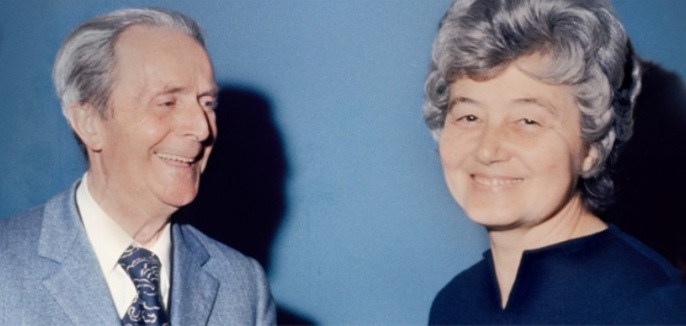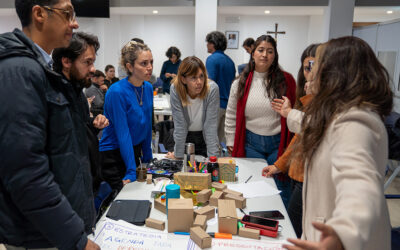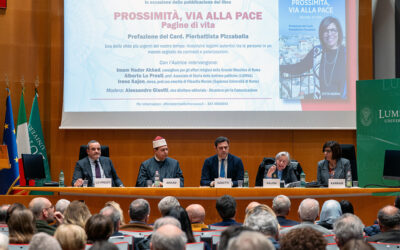« While playing games in the shade of the fir trees beneath the rocks, Chiara continued to speak to her companions about God, the Virgin, and supernatural life, the nature of which was supranature. She co-inhabited always with the Lord, an effect of charity which was edified, atom upon atom.. And so when they would go to the countryside, those alpine forests were transformed into cathedrals, treetops seemed like the heights of holy cities, and flowers and grass were coloured by the presence of angels and saints: all were enlivened in God. The material barriers were removed. This was also a form of reconciliation between the sacred and the profane, due to which, once the ugly, the evil, and the deformed were eliminated, everywhere the values of the life of nature were recovered in all its aspects. Her words, like her works seemed to be an assiduous clearance of mortal debris to reestablish communication. In itself it was simply a merging of nature and the supernatural, of matter with the spirit, and of the earth with heaven. It was a duplication of the values of life on earth, to open a gateway to Paradise. It was the summer of 1949. That enjoyable holiday was enhanced by the inheritance of a cottage in Tonadico di Primiero from Lia Brunet. In July, Chiara Lubich, Foco (Igino Giordani) and the focolarine had gone there to bask in the sunlight and take some personal rest, after the works achieved all year round for the poor. The cottage consisted of an upper barn which they entered through a winding ladder from the ground floor, and was composed of a room and small kitchen. They set up some cot beds and a cupboard that was hauled up by a winch, and the place acted as their dorm. Foco went to the Orsinger Hotel and had the chance to speak before the hall of Capuchins. In their Church he felt the desire to bind himself “tightly” with a vow of obedience, which Chiara felt, however, did not conform to Focolare customs. Instead she proposed making a pact of untiy, in the sense that at the next Eucharistic communion, on the nothingness of their souls, Jesus in her would seal the pact with Jesus in him. That morning at mass, upon receiving communion the two of them made Jesus seal the pact with Jesus. It was then that she started to experience a series of enlightening insights». Igino Giordani, History of the Focolare Movement, an unedited piece.
While playing games in the shade of the fir trees beneath the rocks, Chiara continued to speak to her companions about God, the Virgin, and supernatural life, the nature of which was supranature. She co-inhabited always with the Lord, an effect of charity which was edified, atom upon atom.. And so when they would go to the countryside, those alpine forests were transformed into cathedrals, treetops seemed like the heights of holy cities, and flowers and grass were coloured by the presence of angels and saints: all were enlivened in God. The material barriers were removed. This was also a form of reconciliation between the sacred and the profane, due to which, once the ugly, the evil, and the deformed were eliminated, everywhere the values of the life of nature were recovered in all its aspects. Her words, like her works seemed to be an assiduous clearance of mortal debris to reestablish communication. In itself it was simply a merging of nature and the supernatural, of matter with the spirit, and of the earth with heaven. It was a duplication of the values of life on earth, to open a gateway to Paradise. It was the summer of 1949. That enjoyable holiday was enhanced by the inheritance of a cottage in Tonadico di Primiero from Lia Brunet. In July, Chiara Lubich, Foco (Igino Giordani) and the focolarine had gone there to bask in the sunlight and take some personal rest, after the works achieved all year round for the poor. The cottage consisted of an upper barn which they entered through a winding ladder from the ground floor, and was composed of a room and small kitchen. They set up some cot beds and a cupboard that was hauled up by a winch, and the place acted as their dorm. Foco went to the Orsinger Hotel and had the chance to speak before the hall of Capuchins. In their Church he felt the desire to bind himself “tightly” with a vow of obedience, which Chiara felt, however, did not conform to Focolare customs. Instead she proposed making a pact of untiy, in the sense that at the next Eucharistic communion, on the nothingness of their souls, Jesus in her would seal the pact with Jesus in him. That morning at mass, upon receiving communion the two of them made Jesus seal the pact with Jesus. It was then that she started to experience a series of enlightening insights». Igino Giordani, History of the Focolare Movement, an unedited piece.
Be compassionate
Be compassionate




0 Comments